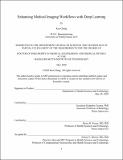Enhancing medical imaging workflows with deep learning
Author(s)
Chang, Ken,Ph. D.Massachusetts Institute of Technology.
Download1193027449-MIT.pdf (8.102Mb)
Other Contributors
Harvard--MIT Program in Health Sciences and Technology.
Advisor
Jayashree Kalpathy-Cramer and Bruce R. Rosen.
Terms of use
Metadata
Show full item recordAbstract
The last few years mark a significant leap in the capability of algorithms with the advent of deep learning. While conventional machine learning has existed for decades, their utility has been rather limited, requiring considerable engineering and domain expertise to design pertinent data features that can be extracted from raw data. In contrast, deep learning methods have yielded state-of-the-art results in a wide range of computer vision tasks without the need for hand-crafted imaging features. At the same time, we are collecting ever-increasing quantities of medical imaging. Together, deep learning models and big data yield a powerful combination. Integrated in the data workflow, the clinic, or at the bedside, these models have the potential to aid with clinical decision-making, improving efficiency, accuracy, and reliability of patient care. However, at present, there is a critical gap between the researchers who develop deep learning algorithms and the clinicians who could utilize the technology to improve patient care. In this thesis, I focus on several challenges that prevent clinical translation of algorithms. First, vast quantities of data needed to train effective models are often dispersed across institutions and cannot be shared due to ethical, infrastructure, and patient privacy concerns. As such, we developed distributed methods of training robust deep learning models that do not require sharing patient data in multi-institutional collaborative settings. Second, it is not clearly understood how decisions in algorithm design can affect model performance. To this end, I showcase how various training, data, and model parameters can impact algorithm prediction and performance. Lastly, while many algorithms are designed to perform a single task, there are few pipelines that have multi-faceted functionality needed in patient care. I demonstrate an integrated and deployable clinical decision support pipeline for glioma and ischemic stroke that is extensible to other diseases.
Description
Thesis: Ph. D. in Medical Engineering and Medical Physics, Harvard-MIT Program in Health Sciences and Technology, May, 2020 Cataloged from the official PDF of thesis. Includes bibliographical references (pages 212-232).
Date issued
2020Department
Harvard--MIT Program in Health Sciences and Technology; Harvard University--MIT Division of Health Sciences and TechnologyPublisher
Massachusetts Institute of Technology
Keywords
Harvard--MIT Program in Health Sciences and Technology.